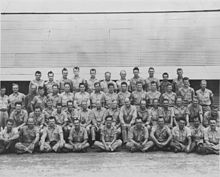| Project Alberta | |
|---|---|
 Group photograph of Project Alberta on Tinian | |
| Active | March – September 1945 |
| Country | |
| Branch | Army Corps of Engineers |
| Equipment | Little Boy, Fat Man, and Pumpkin bombs |
| Engagements | |
| Commanders | |
| Notable commanders | William S. Parsons |
Project Alberta, also known as Project A, was a section of the Manhattan Project which assisted in delivering the first nuclear weapons in the atomic bombing of Hiroshima and Nagasaki during World War II.
Project Alberta was formed in March 1945, and consisted of 51 United States Army, Navy, and civilian personnel, including one British scientist. Its mission was three-fold. It first had to design a bomb shape for delivery by air, then procure and assemble it. It supported the ballistic testing work at Wendover Army Air Field, Utah, conducted by the 216th Army Air Forces Base Unit (Project W-47), and the modification of B-29s to carry the bombs (Project Silverplate). After completion of its development and training missions, Project Alberta was attached to the 509th Composite Group at North Field, Tinian, where it prepared facilities, assembled and loaded the weapons, and participated in their use.